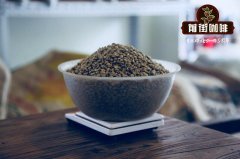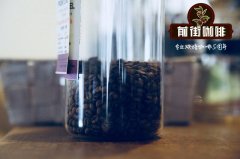Introduction to the origin of organic coffee in Thailand _ which brand of Thai coffee tastes good _ the price of Thai coffee beans

Professional coffee knowledge exchange more coffee bean information please follow the coffee workshop (Wechat official account cafe_style)
● Akama Coffee Farm (Akha Ama)
Aka Amma Coffee Farm is run by a group of aka people (the Akha) living in the village of Maejantai in the mountains of northern Thailand. Because the local climate is very suitable for growing Arabica coffee beans (Arabica), the Thai government led the aka people to grow coffee beans in the 1990s, but they have always been treated by unreasonable transactions by middlemen.
In 2010, the Lee Ayu (Ayu Chuepa) family founded Akama Farm to run Fairtrade coffee, from coffee cultivation to sales, ensuring a reasonable return. Lee's efforts have gradually led to the development of Majiatai Village. So far, 14 aka families have joined the operation of Akama Farm.
Aka Mama Farm operates in a "sustainable environment and management" mode, which has a lot to do with the ethnic character of the aka people, who are traditionally self-sufficient. They have always planted and collected all kinds of food and supplies needed for their own life, and live through cooperation with nature, rather than fighting and conquering nature. This traditional view of national culture coincides with the current trend of sustainable agriculture. Akama Farm has mixed crops, reducing the use of chemical fertilizers and herbicides; coffee crops, which are as tall as humans, are planted between taller fruit trees and a variety of vegetables, which are good for soil ecology and produce humus soil. prevent hillside erosion and help retain water during the dry season. Through regular crop rotation, the negative impact of pests on crops has also decreased.
In 2010 and 2011, Akama Farm coffee stood out in the World Cup Tester Competition (World Cup Tasters Championship) held by the European Fine Coffee Association (Speciality Coffee Association). It was certified as an excellent coffee with unique quality and taste recognized by consumers, and reached the highest standard in the cultivation, roasting, storage and brewing of green coffee.
● Bean Yichang Coffee Farm (Doi Chaang)
Located in the mountains of northern Thailand (near the border between Laos and Myanmar), Doi Chaang village, assisted by the Thai government in the 1960-90's, provided winter crops, including Arabica coffee beans (Arabica), and encouraged residents to switch from opium cultivation to coffee cultivation. Like the Akkas, the non-Thai mountain minorities did not speak Thai, and at that time the coffee market was still not sound and they could only rely on middlemen to assist in sales, but were exploited.
In 2003, Panachai Pisailert, a Wicha Phromyong of Douyichang Village, co-founded Douyichang Coffee Co., Ltd. (Doi Chaang Coffee Original Co., Ltd.) with Pitsanuchai Kaewpichai to strive for the sustainable development of coffee cultivation. The village tribes working with Dou Yichang Coffee Co., Ltd. also include Akha, Lisu and Chinese. After 15 years of joint efforts, they now cover 11000 acres of coffee growing land. Coffee beans are sold in many retail stores in Thailand, Canada and Southeast Asia, as well as many coffee shop branches.
Dou Yichang Coffee Farm is organically certified by USDA to provide consumer-friendly environment-friendly and personal-friendly ethical products. When Arabica coffee was planted that year, vast forests were destroyed by over-irrigation because these crops needed a lot of good and stable water. However, the high quality of Arabica also depends on the shade and ecological diversity of the environment.
To this end, farmers in Dou Yichang are working together to establish and maintain forests and plant multi-level shade. Today, for farmers in Dou Yichang, it is a consensus that "coffee planting is equivalent to afforestation", taking good care of every link from the earth to the cup to ensure the highest quality coffee in general.
The main goal of Dou Yichang Coffee is to help Dou Yichang coffee farmers to get better prices when selling crops and to develop and maintain the quality of Dou Yichang Coffee. To this end, in 2006, they partnered with Canadian John M. Darch to buy coffee beans produced in Thailand by Canadian partners, while the Canadian side engaged in roasting, market distribution, etc. (currently the main markets are South America and the United Kingdom), and promised that coffee producers would be able to obtain 50% of the sales profits, committed to fair trade.
Today, Baan Doi Chang has become one of the major areas in the world where high-quality Arabica coffee is grown. In August 2015, the geographical indications of the European Union (EU) certified the registration of Doi Chaang Coffee.
● from the Earth to the Cup
Thai coffee bean processing from planting to selective picking, to wet fermentation, have been specially prepared, after years of certification, known as world-class special coffee. Its unique aroma, balanced acidity, low caffeine content and perfect growth conditions only make Thai coffee beans one of the best Arabica coffee in the world.
Qianjie coffee: Guangzhou bakery, the store is small but a variety of beans, you can find a variety of unknown beans, but also provide online store services. Https://shop104210103.taobao.com
Important Notice :
前街咖啡 FrontStreet Coffee has moved to new addredd:
FrontStreet Coffee Address: 315,Donghua East Road,GuangZhou
Tel:020 38364473
- Prev

2018 Thai Coffee beans recommended _ Thai Merlot Yunwu Coffee Flavor introduction _ how to drink Northern Thailand Coffee
Professional coffee knowledge exchange more coffee bean information please follow the coffee workshop (Wechat official account cafe_style) 2018 Thai companion gift, buy Thai coffee beans! The most expert! The most respectable! Better drink! Each carefully selected, adhere to hand-picked beans, professionals tailored baked bean manor G1 Arabica, shallow roasted coffee beans Messler cloud Thai coffee beans 1300 above sea level
- Next

Chiang Mai Coffee recommended _ is Chiang Mai Coffee in Thailand good? how much is the Thai coffee bean per jin
Professional coffee knowledge exchange more information about coffee beans Please follow the coffee workshop (Wechat official account cafe_style) located in Chiang Mai in northern Thailand, which is one of the popular tourist hotspots in recent years. Apart from the rich history of Buddhist temples and beautiful scenery, what visitors like is ── coffee, which represents the local leisurely life and culture. Based on the second largest in Thailand
Related
- What documents do you need to go through to open a coffee shop? coffee shop coffee shop certificate processing process
- How to purchase Coffee beans in small Cafe how to choose a suitable supplier for domestic Coffee supply Company
- How to drink Starbucks Fragrance White Coffee? how to make Australian White Coffee? what Italian coffee beans are recommended?
- The Story of Flora Coffee: the name of Flora Coffee Bean and the implication of the Flowers on Florna Coffee
- How much does a cup of coffee cost? How much is the profit of a cup of coffee? What is the profit of the coffee shop in a year?
- Yunnan small Coffee, known as "fragrant Coffee", introduces the characteristics of Alpine Arabica Coffee producing areas in Yunnan, China
- 2023 latest Starbucks full menu price list how much is a cup of Starbucks coffee what is better to drink the most popular hot and cold drinks recommended
- Starbucks different kinds of Coffee Price list Starbucks menu 2023 Top Ten Best drinks in Starbucks
- Starbucks Spring praise Comprehensive matching Coffee Bean theme Story Packaging implication and taste description
- The cost of a cup of coffee latte American coffee cost price and selling price

